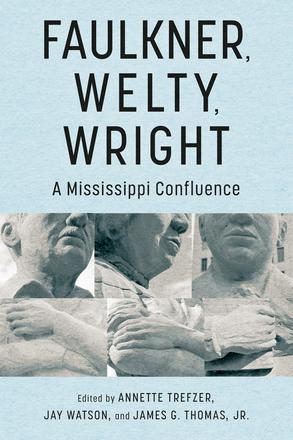
Faulkner, Welty, Wright
A Mississippi Confluence
An engaging, diverse collection that considers together a trio of Mississippi literary giants
Description
Contributions by Anita DeRouen, Susan V. Donaldson, Julia Eichelberger, W. Ralph Eubanks, Sarah Gilbreath Ford, Bernard T. Joy, John Wharton Lowe, Anne MacMaster, Rebecca Mark, Suzanne Marrs, Donnie McMahand, Kevin Murphy, Harriet Pollack, Annette Trefzer, Jay Watson, and Ryoichi Yamane
Working closely in each other’s orbit in Mississippi, William Faulkner, Eudora Welty, and Richard Wright created lasting portraits of southern culture, each from a distinctly different vantage point. Taking into consideration their personal, political, and artistic ways of responding to the histories and realities of their time and place, Faulkner, Welty, Wright: A Mississippi Confluence offers comparative scholarship that forges new connections—or, as Welty might say, traces new confluences—across texts, authors, identities, and traditions.
In the collection, contributors discuss Faulkner’s Light in August; Sanctuary; Go Down, Moses; As I Lay Dying; “A Rose for Emily”; and “That Evening Sun”; Welty’s One Writer’s Beginnings; One Time, One Place; The Optimist’s Daughter; Losing Battles; “Why I Live at the P.O.”; “Livvie”; “Moon Lake”; “The Burning”; “Where Is the Voice Coming From?”; and “The Demonstrators”; and Wright’s Native Son; The Long Dream; 12 Million Black Voices; Black Boy; Lawd Today!; “The Man Who Lived Underground”; “The Ethics of Living Jim Crow”; and “Long Black Song.”
Acknowledging that Mississippi ground was never level for any of the three writers, the fourteen essays in this volume turn from the familiar strategies of single-author criticism toward a mode of analysis more receptive to the fluid mergings of creative currents, placing Wright, Welty, and Faulkner in comparative relationship to each other as well as to other Mississippi writers such as Margaret Walker, Lewis Nordan, Natasha Trethewey, Jesmyn Ward, Steve Yarbrough, and Kiese Laymon. Doing so deepens and enriches our understanding of these literary giants and the Mississippi modernism they made together.